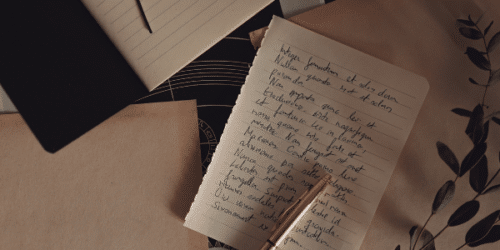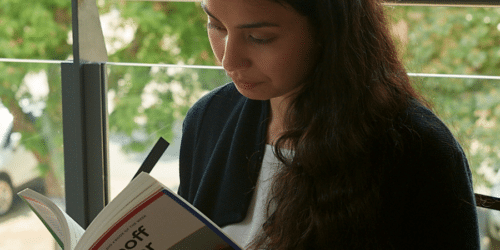
Read widely
As with all forms of writing, one of the best ways you can improve as a poet is by reading a broad range of poetry. From the classics to contemporary poetry collections, from page to stage and spoken word performances, there is a huge breadth of poetry out there for you to explore. Reading can not only influence your writing but it can also expose you to new ways of crafting your own unique poems. Kathryn Simmonds, poet and NCW Academy tutor, has shared her recommendations for reading like a poet here.
Start with play
Creativity flows at its peak when you release your inhibitions and embrace a playful energy. With a playful energy, the inspiration for a poem can come from anywhere – an overheard conversation on your commute, the way the light passes through a jar of honey as you cook, the taste of an orange on your tongue… Start to look at the world with magpie eyes and see how many poems you can develop out of your day to day routine. If you’re looking for somewhere to start, we recommend taking poet and NCW Academy tutor Helen Ivory‘s poetry challenge, a fun exercise to refresh your writing routine.
Combine the concrete and the abstract
It’s a simple concept, but a highly effective one which can transform the ordinary into poetry. Take something real, something that you can hold, and pair it with something intangible to create new and exciting imagery and symbolism. Helen Ivory likes to grab her reader’s attention by making things strange, in this article she shares guidance for pushing puns, ideas, and metaphors as far as your can.
Switch off
Sometimes, the pressure to write something good can be enough to stop you writing anything at all. Maintaining the motivation to write poetry is a challenge poets at all stages of their careers struggle with. Stepping away from the blank page can be one of the best ways to loosen the mind – go out into the world and allow it’s inspiration to seep into you before putting pen to paper. In this blog, poet and Kickstart Your Poetry tutor Rebecca Goss emphasises the importance of being open to unexpected inspiration, and recommends stepping away from your pen and paper and instead reading, listening and watching things outside of your comfort zone.
Take a course
Sometimes the best poems are produced in a supportive and collaborative environment under the guidance of an experienced tutor. With NCW Academy, you can find a course that’s at the right stage for you and your poetry. Whether you’re looking for something free and flexible, like our self-paced courses, or you want a dedicated tutor providing personal feedback, you’ll be able to find a course that will help you in the next steps of your writing journey.
Writing exercise
Here’s an example exercise from the second module of ‘Kickstart Your Poetry‘, our online tutored poetry course led by Rebecca Goss.
This exercise is about close-looking. It is about spending some time sitting still and seeing with fresh eyes (ears, noses, ears and hands!). You will need an orange or citrus fruit of some variety.
- Firstly look at it from the outside. Feel the weight of it, throw it and catch it, smell it –engage with it. It is a special orange, not any old orange. Does it remind you of anything else? Now write for five minutes about that experience.
- Next, begin to peel the orange. Note what the peel feels like, what happens when you remove it? What does it look like; smell like; does it make any noise? What does the act of peeling the orange feel like? What happens to your hands? The room? Use all of your senses to construct your image. Does it remind you of anything at all? Write for five minutes.
- Now consider the flesh of the orange. As a whole. Then break it apart and look closely at the segments – look with all your senses. Write for five minutes.
- Finally, begin to eat the orange. Write all that you sense and all that you might remember of past orange-eating experience. If you do not like oranges write about the moment you decided that this was the case. Again, write for five minutes.
- Read back and see what you have and consider how you might edit your writing. For example, think about Jacob Polley’s poem, A Jar of Honey, which is centred on the idea of light. Is there anything in your notes that might work as a similar focus? Or perhaps you have a poem in several segments/stanzas that show different ways at looking at an orange. Either way, you would have thought about the orange in unexpected ways you might not have thought of before this exercise.
Find out more about our beginners’ poetry course →
You may also like...
Making Strange: how to write captivating poetry
In this article, poet and NCW Academy tutor Helen Ivory shares her poem ‘The Square of the Clockmaker’, which was chosen to be one of the Poems on the Underground, and how she grabs her readers attention with her poetry by making things strange.

5th January 2024
How to read like a poet
In this article, poet and NCW Academy tutor Kathryn Simmonds shares how reading has influenced her poetry, and encouraged her to play with form, subject and tone.

8th December 2023
Take the poetry challenge!
Because all creative endeavours must have play at their heart. Poet, visual artist and frequent NCW tutor Helen Ivory offers a taster exercise on how to use play in your writing to develop new material.

17th January 2023






